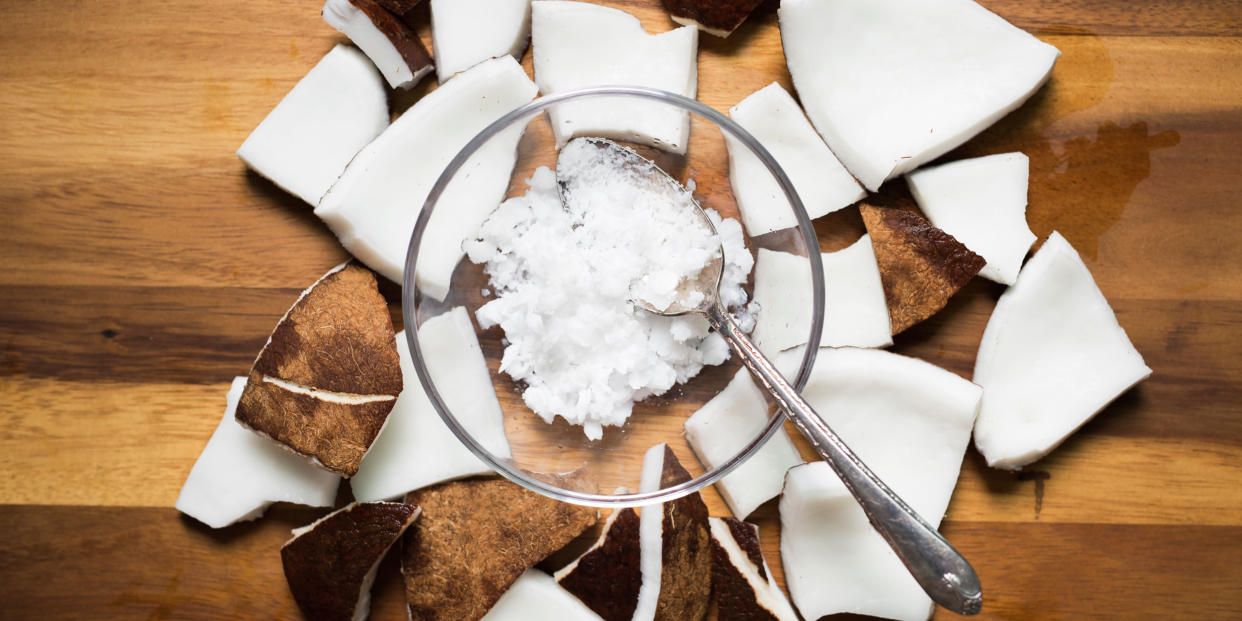Coconut Oil Is Actually Terrible For You

Sure, coconut oil sounds healthy AF - after all, it's natural, vegan, and used in products found on almost every aisle of most health food stores. (I see you, vegan cupcakes! And crackers! And chips!)
However, a new review from the American Heart Association (AHA) suggests the ingredient isn't nearly as healthy as you'd think: It confirmed that reducing overall saturated fat intake by swapping foods like coconut oil, which is particularly high in saturated fat, for foods containing polyunsaturated or monounsaturated fats is an effective way to reduce cardiovascular disease.
Although it's no secret that coconut oil is rich in saturated fat, the AHA report explicitly grouped coconut oil with the likes of butter and lard, two foods that have long been frowned upon by nutritionists. It's an association that's triggered many alarmist headlines and led coconut oil fans to just about lose it.
What's the big deal about saturated fat in coconut oil?
Data on saturated fat emerged in the 1960s, when it became pretty clear that the stuff raises LDL cholesterol, a risk factor for heart disease. Around the same time, the AHA began warning people to minimize saturated fat, including tropical oils like coconut oil and palm kernel oil, both comprising 82 percent saturated fat.
However, 2016 research published in BMJ cast doubt on these recommendations: Researchers found that following the AHA recommendations - by replacing saturated fat from food sources like animal fats, margarines, and shortenings with polyunsaturated fats from corn oil and polyunsaturated margarine made from corn oil - didn't actually reduce people's risk of death from heart disease or any other cause.
Still, "most cardiologists agree that [saturated fats] can lead to higher rates of cardiovascular disease," says George Welch, MD, a cardiologist with Manhattan Cardiology. And you can't argue with the fact that other oils, which actually help lower LDL cholesterol, are relatively healthier.
Does coconut oil have ANY redeeming health value?!
Although most dietary fats are made up of molecules known as long-chain triglycerides, which are processed by the liver before being converted to energy or stored as fat, coconut oil is ~*sPeCiAl~* in that it contains medium-chain triglycerides. Because those molecules don't have to be processed by the liver, they can be converted to energy more quickly, according to Alissa Rumsey, registered dietitian and owner of Alissa Rumsey Nutrition and Wellness - and that's a good thing for people who are trying to lose weight and would rather burn dietary fat than store it.
Brazilian researchers who authored a 2015 review of existing studies on coconut oil's benefits suggest this theory could deliver measurable benefits for dieters: Weight loss diets that include coconut oil appeared to reduce abdominal fat more effectively than similar diets including alternative oil made up of unsaturated fats, according to several interventional studies cited in the review.
More research is needed - particularly since only about 15 percent of the fat in coconut oil comes from these medium-chain triglycerides, according to Rumsey. "[It] doesn't seem to be enough to get the benefits," she says.
Is coconut oil *really* as bad for you as butter?
Technically, coconut oil may be slightly worse - at least by the numbers. Gram for gram, coconut oil (82 percent saturated fat) contains more saturated fat than butter (63 percent), according to data presented in the AHA's new review. By the same measure, the healthiest oil sources include safflower oil, followed by canola oil, sunflower oil, corn oil, and olive oil, respectively, since they contain the least saturated fat, with higher monounsaturated and polyunsaturated fat content compared to coconut oil.
I don't have heart disease. Do I have to care about any of this?
Unfortunately, yes, according to Dr. Welch. That's because the average American consumes a diet in which 11 percent of calories come from saturated fats, according to the USDA. Meanwhile, the USDA recommends healthy people cap their sat fat intake at 10 percent of calories per day to sidestep problems down the road. (FWIW, those who already have issues like high LDL cholesterol, which amps up that heart-disease risk, should be even more careful, consuming no more than 5 to 6 percent of calories from saturated fats, Dr. Welch says.)
Because math is hard - who knows where even one percent of your calories come from?! - it's easier just to minimize foods high in saturated fat, including coconut oil. "If you’re eating a balanced diet [made up of plant-based foods, green, leafy vegetables and lean protein like chicken/fish] you should have low saturated fat intake," Dr. Welch says.
Can I still put coconut oil on my body?
Short answer: YAS! The AHA's only concerns involve the consumption of coconut oil. So while you might want to eat it sparingly, no one's saying the product's hazardous to your face, body, or hair - and thank goodness, since coconut oil does ALL THE THINGS!
TL;DR
At the end of the day, "No one food will make you healthy, just like no one food will make you unhealthy," Rumsey says. So while it's cool to include some saturated fats in a varied diet that also includes other sources of unsaturated fat from food sources like nuts, seeds, and other oils, the takeaway is that coconut oil - or butter or lard, for that matter - should be consumed in moderation. And you already knew that.
Get all the ~FiTsPiRaTiOn~ directly in your feed. Follow Facebook.com/CosmoBod.
Follow Elizabeth on Twitter and Instagram.
You Might Also Like

